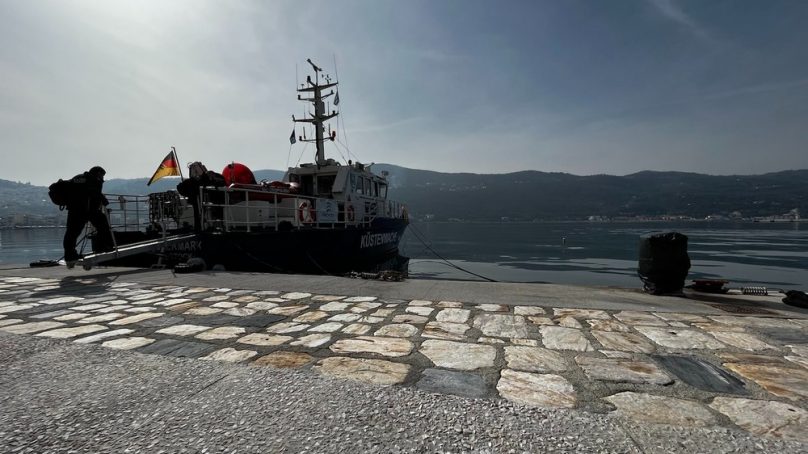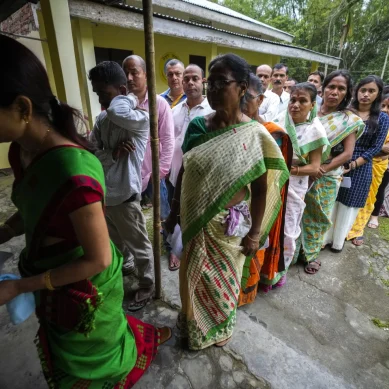
In May this year, a Greek court sentenced Abdallah, Kheiraldin, and Mohamad, three Syrian refugees whose full names have not been disclosed in court documents, to a combined 439 years in prison for “facilitating unauthorised entry” into Greece.
The charges against them stemmed from a shipwreck that took place on Christmas Eve last year. The men had been piloting a boat packed with around 80 people attempting to make the clandestine journey from the Turkish coast to Italy and had ended up at the helm only because the smugglers who organised the trip had offered them discounted fares, according to the three men’s lawyer.
The overcrowded boat ran into trouble near the Greek island of Paros and capsized – 18 people drowned. The smugglers responsible for organising the trip and overloading the boat were out of reach in Turkey. But Greek police arrested Abdallah, Kheiraldin and Mohamad and prosecuted them as smugglers.
The case against the three men is not an anomaly, but a particularly egregious example of a trend taking place across Europe: Since the 2015 migration crisis, European countries have increasingly prosecuted asylum seekers and migrants using laws intended to combat people smuggling.
The same laws have also been used to crack down on civil society organisations and activists providing humanitarian support to people migrating. But while those cases – mainly involving European citizens – often garner media attention, cases involving asylum seekers and migrants are frequently overlooked.
Between 2015 and 2021, Italy detained over 2,000 asylum seekers and migrants on smuggling charges. In Greece, 7,000 people were arrested for smuggling between 2015 to 2019.
Meanwhile, in the UK hundreds of people have been arrested and dozens convicted of crimes related to people smuggling since the number of people crossing the English Channel on small boats from France began to increase in 2019.
European law enforcement agencies and governments say the prosecutions are meant to protect asylum seekers and migrants by breaking the business model of unscrupulous people smugglers. But lawyers and migration advocates argue that the cases criminalise vulnerable people who are seeking safety and opportunity.
They also say that the arrests allow authorities to claim action is being taken to combat irregular migration while sending a message to would-be asylum seekers and migrants that they are not welcome.
“The government, and also judges, have been trying to send a message… saying, ‘Watch out, do not come, because we’ll give you severe penalties’,” Rosa Lo Faro, an Italian lawyer who has defended dozens of asylum seekers and migrants accused of people smuggling, told The New Humanitarian. “But people don’t stop.”
The New Humanitarian spent more than six months speaking to more than 50 people – including lawyers, asylum seekers, academic researchers, and human rights advocates – and analysing court documents from the UK, Italy, and Greece – three countries at the receiving end of prominent maritime migration routes. We found that:
Many of those prosecuted have either been wrongly accused or ended up steering a boat through happenstance or coercion;
Once accused, structural inequalities in European legal systems – such as a lack of qualified interpreters and difficulties accessing quality legal counsel – create barriers to them having fair trials;
While awaiting trial, asylum seekers and migrants can spend months, even years, in pre-trial detention because they lack quality legal support and a permanent address in Europe;
Once cases do go to trial, there are numerous examples of people who have been able to secure quality legal council being found innocent or having their convictions overturned on appeal;
Those who are found innocent have a hard time accessing compensation or redress of grievance for the time they spent behind bars;
And criminal prosecutions can make it more difficult for people who are found innocent to access asylum procedures, leaving them little choice other than to become undocumented in Europe or return to their home countries.
“These people are victims of the system,” said Flavia Patané, a researcher at the faculty of law of Maastricht University in the Netherlands who studies the involvement of asylum seekers and migrants in people smuggling activities.
Badr, a 34-year-old from Morocco, is one of thousands of people whose lives have been altered by European countries’ prosecution of asylum seekers and migrants as smugglers.
In 2013, when he was 25, Badr left his hometown of Kenitra in northwest Morocco because he didn’t see a future in his country, making his way to Libya, where he found work as a day labourer. But Libya grew more chaotic and dangerous, and in 2015 Badr decided it was time to leave. At the time, thousands of people who were trying to reach Europe – from Syria, Eritrea, and elsewhere – were departing from Libya every month.
On a calm August night, a smuggler brought Badr to a beach along with hundreds of others. He soon found himself packed onto an overcrowded wooden boat. As it set out to sea, the waves got rougher, and the engine started to overheat. Badr heard screams.
“We realised there were people below us,” he said over Zoom in March this year.
Before the boat was rescued by a Swedish Coast Guard vessel taking part in an EU border control mission, 53 people in the engine room had died from asphyxiation. When the Swedish ship docked in Palermo, Badr did not have time to process the fact that he had survived the crossing.
Instead, he was immediately arrested and charged with facilitating illegal migration and causing the deaths of the people who had suffocated in the engine room. The Italian prosecutors in charge of the case asked for a life sentence.
The law that Badr was prosecuted under – introduced in 1998 – criminalises the act of promoting, directing, organising and financing irregular migration, but also transporting people without visas, or “facilitating” their movement.
“Italian law doesn’t differentiate between who ends up steering a boat and who organises the smuggling… with devastating consequences for people who are not responsible for smuggling but who are themselves victims of it,” said Germana Graceffo, a lawyer with the NGO Borderline Sicilia.
- The New Humanitarian report











